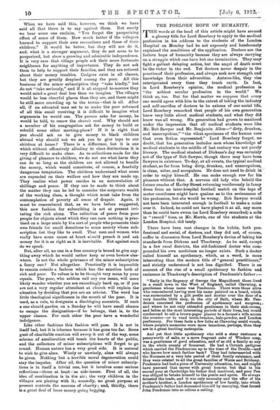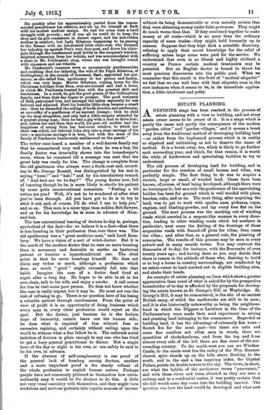THE FORLORN HOPE OF HUMANITY.
THE words at the head of this article might have seemed a gloomy title for Lord Rosebery to apply to the medical profession in his address to the students of the London- Hospital on Monday had he not expressly and handsomely explained the conditions of the application. Doctors are the forlorn hope of humanity because they are always carrying
on a struggle which can have but one termination. They may' fight a gallant delaying action, but the angel of death must be the victor in the end. Yet doctors never despair in the practice of their profession, and always seek new strength and
knowledge from their adversities. Anta3us-like, they rise reinvigorated every time they touch earth. In fact, in Lord Rosebery's opinion, the medical profession is
"the noblest secular profession in the world." We think so, too. But for that matter we suppose that every one would agree with him to the extent of taking the industry and self-sacrifice of doctors to be axioms of our social life. Lord Rosebery remarked that people of his own generation knew very little about medical students, and what they did know was all wrong. His generation had grown to manhood under the impression that all medical students were like Mr. Bob Sawyer and Mr. Benjamin Allen—" dirty, drunken, and unscrupulous," "the vilest specimens of the human race that even fiction represented." Lord Rosebery forgot, no doubt, that his generation includes men whose knowledge of medical students in the middle of last century was not purely literary. The medical student of Dickens's day was certainly not of the type of Bob Sawyer, though there may have been Sawyers in existence. To-day, at all events, the typical medical student, so far from being dirty, drunken, and unscrupulous, is clean, sober, and scrupulous. He does not need to drink in order to enjoy himself. He can make enough row for his pleasure without that. A nervous old lady who beheld the future oracles of Harley Street returning vociferously in fancy dress from an inter-hospital football match on the tops of motor omnibuses might have qualms as to the seriousness of the profession, but she would be wrong. Bob Sawyer would not have been interested enough in football to make a noise over it. Indeed, he could not have played it at all, any more than he could have swum (as Lord Rosebery remarked) a mile in "record" time, as Mr. Morris, one of the students at the London Hospital. did lately.
There have been vast changes in the habits, both pro.
fessional and social, of doctors, and they did not, of course, suffer in dimension from Lord Rosebery's device of taking his standards from Dickens and Thackeray. As he said, except in a few rural districts, the old-fashioned doctor who com- pounded his own medicines no longer exists. Such a doctor called himself an apothecary, which, as a word, is more interesting than the modern title of " general practitioner," and strictly understood is not less dignified. There is an account of the rise of a small apothecary to fashion and eminence in Thackeray's description of Pendennis's father :—
" Early in the Regency of George the Magnificent there lived in a small town in the West of England, called Clavering, a. gentleman whose name was Pendennis. There were those alive who remembered having seen his name painted on a board, which was surmounted by a gilt pestle and mortar over the door of a very humble little shop, in the city of Bath, where Mr. Pen- dennis exercised the profession of apothecary and surgeon;,- and where he not only attended gentlemen in their sick-rooms, and ladies at the most interesting periods of their lives, but would condescend to sell a brown-paper plaster to a farmer's wife across the counter—or to vend tooth-brushes, hair-powder, and London perfumery. For these facts a few folks at Clavering could vouch, where people's memories were more tenacious, perhaps, than they are in a great bustling metropolis.
And yet that little apothecary who sold a stray customer a pennyworth of salts, or a more fragrant cake of Windsor soap, was a gentleman of good education, and of as old a family as any in the whole county of Somerset. He had a Cornish pedigree which carried the Pendennises up to the time of the Druids—and who knows how much farther back ? They had intermarried with the Normans at a very late period of their family existence, and they were related to all the great families of Wales and Brittany. Pendennis had had a piece of University education, too, and might have pursued that career with great honour, but that in his second year at Cambridge his father died insolvent, and poor Pen was obliged to betake himself to the pestle and apron. He always detested the trade, and it was only necessity and the offer of his mother's brother, a London apothecary of low family, into which Pendennis's father had demeaned himself by marrying, that forced John Pendennis into so odious a calling.
He quickly after his apprenticeship parted from the coarse- minded practitioner his relative, and set up for himself at Bath with his modest medical ensign. He had for some time a hard struggle with poverty ; and it was all he could do to keep the shop and its gilt ornaments in decent repair, and his bed-ridden mother in comfort; but Lady Ribetone happening to be passing to the Rooms with an intoxicated Irish chair-man who bumped her ladyship up against Pen's very door-post, and drove his chair- pole through the handsomest pink bottle in the surgeon's window, alighted screaming from hor vehicle, and was accommodated with a chair in Mr. Pendennis's shop, where she was brought round with cinnamon and sal-volatile.
Mr. Pendennies manners were so uncommonly gentlemanlike and soothing that her ladyship, the wife of Sir Pepin Ribstone, of Codlingbury, in the county of Somerset, Bart., appointed her pre- server, as she called him, apothecary to her person and family, which was very large. Master Ribstone, coming home for the Christmas holidays from Eton, over-ate himself and had a fever, in which Mr. Pendennia treated him with the greatest skill and tenderness. In a word, he got the good graces of the Codlingbury family, and from that day began to prosper. The good company of Bath patronised him, and amongst the ladies especially he was beloved and admired. First his humble little shop became a smart one : then he discarded. the selling of tooth-brushes and perfumery, as unworthy of a gentleman of an ancient lineage ; then he shut up the shop altogether, and only had a little surgery attended by a genteel young man ; then he had a gig with a man to drive him ; and, before her exit from this world, his poor old mother had the happiness of seeing from her bed-room window, to which her chair was rolled, her beloved John stip into a close carriage of his own—a one-horse carriage it is true, but with the arms of the family of Pendennis handsomely emblazoned on the panels."
The writer once heard a member of a well-known family say that he remembered very well how, when he was a boy, the family doctor was invariably shown into the housekeeper's room, where he remained till a message was sent that the great lady was ready for him. The change is complete from the old gentleman who always wore a frock-coat and, accord- ing to Mr. George Russell, was distinguished by hie zeal in saying " hum!" and " bah!" and by his introductory remark of, "And how are we to-day?" The young doctor now, full of learning though he be, is more likely to startle his patient by some quite unconventional comments. "Feeling a bit rotten are you? Well, it's not to be wondered at after what you've been through. All you have got to do is to try to
stick it out, and, of course, I'll do what I can to help you," and so on. This man is a nicer type than sodden Bob Sawyer, and as for his knowledge he is mons in advance of Hum- and-bah.
The less conventional bearing of doctors to-day is, perhaps, symbolical of the fact—for we believe it is a fact—that there is less humbug in their profession than ever there was. The old apothecary was a " great medicine-man," said Lord Rose- bery. We have a vision of a sort of witch-doctor. But it is the merit of the modern doctor that he uses no more humbug than is necessary and desirable to soothe an hysterical patient or humour a hypochondriacal one. The chief point is that he never humbugs himself. He does not claim any virtue or merit, although a profession which does so much " good " might excusably fall into that habit. Imagine the case of a doctor dead tired at night after a long day. He hopes to be able to sit in his arm-chair, talk to his wife, and enjoy a smoke. A call comes for him to visit some poor person. He does not know whether the case is really urgent, but it may be. He must not run the risk of refusing to go. There is no question here of his losing a valuable patient through carelessness. From the point of view of profit it is an opportunity of doing business which every man in every other profession would reject on the spot. But the doctor, just because he is the forlorn hope of humanity, cannot leave out the human side; he does what is required of him without fuss or excessive repining, and certainly without calling upon the world to witness what a fine fellow he is. The enforced social isolation of doctors is plain enough to any one who has tried to get a busy general practitioner to dinner. Not a single hour of the day or night is his own, or can safely be said to be his own, in advance.
If the absence of self-complacency is one proof of the general lack of humbug among doctors, another and a more important proof is the steady refusal of the whole profession to exploit human nature. Perhaps people have not commonly pictured to themselves how extra- ordinarily easy it would be for doctors to do this. A little not very venal casuistry with themselves, and they might turn credulous and nervous patients into regular sources of income
without its being demonstrable or even morally certain that they were obtaining money under false pretences. They might do much worse than that. If they combined together to make money at all costs—which is no more than the ordinary rapacity of some trades—they might hold humanity up to ransom. Suppose that they kept dark a scientific discovery, refusing to apply their secret knowledge for the relief of suffering unless large sums were paid for the service. We understand that even in so liberal and highly civilized a country as France certain medical treatments may be patented. But an English doctor is bound to throw his most precious discoveries into the public pool. When we remember that this result is the fruit of "medical etiquette" we feel that we can well bear with that etiquette even in the rare instances when it seems to be, in its immediate applica- tion, a little intolerant and petty.



















































 Previous page
Previous page